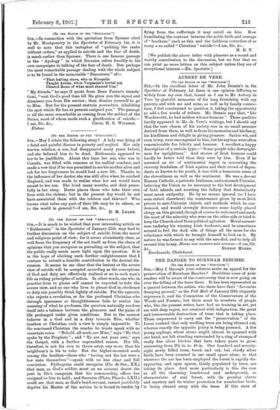[To THZ EDITOR Or TRH .SUICTITOR:] SIE,—It is much to
be wished that your interesting article on " Euthanasia " in the Spectator of January 25th may lead to further discussion on the subject of suicide from the moral and religious point of view; for it seems abundantly clear, as well from the frequency of the act itself as from the chaos of opinions that you recognise as prevailing on the subject, that the public really needs more light upon the question. It is in the hope of eliciting such further enlightenment that I venture to submit a humble contribution to the desired dis- &salon. It seems to me clear that the lenient or the severe view of suicide will be accepted according as the conceptions Of God said duty are effectively realised or no in each man's Life as ruling principles of action. In other words, one who in practice lives to please self cannot be expected to take the severe view, and no one who lives to please God in obedience to duty can possibly think lightly of suicide. For the agnostic who rejects a revelation, or for the professed Christian who through ignorance or thoughtlessness fails to realise the meaning of what he professes, the question naturally resolves itself into a balance between the pleasures and the pains of life prolonged under given conditions. But to the earnest believer in a God and in a duty towards Him, whether heathen or Christian, such a view is simply impossible. To the convinced Christian the oracles he trusts speak with no uncertain voice. "Behold, all souls are Mine," says "He that spake by the Prophets " ; and "Ye are not your own," says the Gospel, with a further superadded reason. His life, therefore, is not his own to throw away, any more than his neighbour's is his to take. But the higher-mounted souls among the heathen—those who "having not the law were a Law unto themselves "—speak with no less clear and full conviction. Pythagoras could recognise (Cie. de Sen., XX.) that man, as God's soldier, must on no account desert the post in life's campaign that his commanding officer has assigned to him to hold; and Socrates (Plato, Phaedo, LXH.) could see that man, as God's bond-servant, cannot justifiably deprive his Master of the service he is bound to render, by










































 Previous page
Previous page